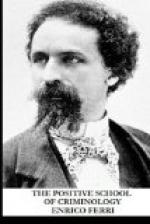Gradually the anthropocentric illusion has been compelled to give way before the results of science, and today the theories of Darwin have become established among our ideas. But another illusion still remains, and science, working in the name of reality, will gradually eliminate it, namely the illusion that the nineteenth century has established a permanent order of society. While the geocentric and anthropocentric illusions have been dispelled, the illusion of the immobility and eternity of classes still persists. But it is well to remember that in Holland in the sixteenth century, in England in the seventeenth, in Europe since the revolution of 1789, we have seen that freedom of thought in science, literature and art, for which the bourgeoisie fought, triumphed over the tyranny of the mediaeval dogma. And this condition, instead of being a glorious but transitory stage, is supposed to be the end of the development of humanity, which is henceforth condemned not to perfect itself any more by further changes. This is the illusion which serves as a fundamental argument against the positive school of criminology, since it is claimed that a penal justice enthroned on the foundations of Beccaria and Carrara would be a revolutionary heresy. It is also this illusion which serves as an argument against those who draw the logical consequences in regard to the socialistic future of humanity, for the science which takes its departure front the work of Copernicus, Galilei and Darwin arrives logically at socialism. Socialism is but the natural and physical transformation of the economic and social institutions. Of course, so long as the geocentric and anthropocentric illusions dominate, it is natural that the lore of stability should impress itself upon science and life. How could this living atom, which the human being is, undertake to change that order of creation, which makes of the earth the center of the universe and of man the center of life? Not until science had introduced the conception of a natural formation and transformation, of the solar system, as well as of the fauna and flora, did the human mind grasp the idea that thought and action can transform the world.
For this reason we believe that the study of the criminal, and the logical consequences therefrom, will bring about the complete transformation of human justice, not only as a theory laid down in scientific books, but also as a practical function applied every day to that living and suffering portion of humanity which has fallen into crime. We have the undaunted faith that the work of scientific truth will transform penal justice into a simple function of preserving society from the disease of crime, divested of all relics of vengeance, hatred and punishment, which still survive in our day as living reminders of the barbarian stage. We still hear the “public vengeance” invoked against the criminal today, and justice has still for its symbol a sword, which it uses more than the scales. But a judge born




